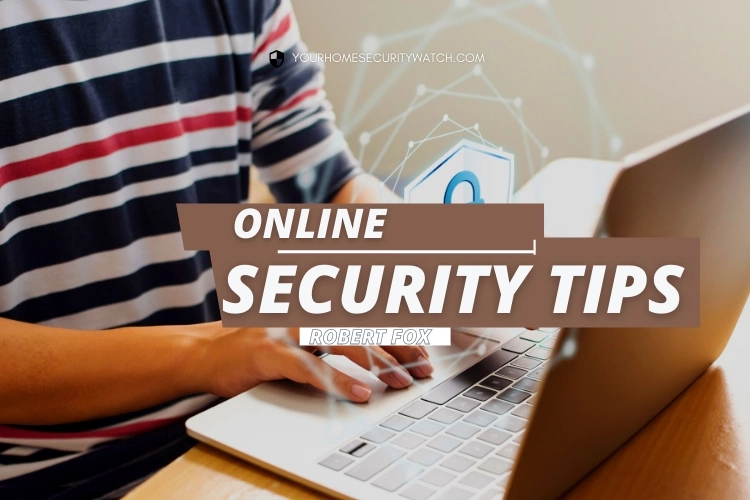Online Security Tips - an Essential Guide to Being Safe on the Web
by Robert Fox
With more and more people being connected every day online, ensuring that you and your personal information stay safe and secure while being online cannot be stressed enough. Especially with the rise of cyber attacks in the world today, keeping ahead of the game and not falling victim to one of these attacks is something we can all do.
Contents
- Online Security Tips
- Tip #1: Install protective software and keep it up-to-date
- Tip #2: Keep your operating system and software up-to-date
- Tip #3: Practice and utilize good password management
- Tip #4: Avoid phishing scams & suspicious emails
- Tip #5: Perform regular backups
- Tip #6: Be careful what you post on social media
- Tip #7: Watch what you decide to click on
- Tip #8: Don't leave your device unattended
- Tip #9: Don't plug in strange devices
- Tip #10: Safely using your mobile devices
- More from my site
Online Security Tips

So, how can you keep you and your personal information safe? Simply follow our list of online security tips below - it's our essential guide to being safe on the web. After all, don't you want to ensure that your being safe while on the web? I know we do!
Not sure what to look out for? Check out our Most Common Online Security Threats You Should Know About article to get yourself updated and properly informed.
Tip #1: Install protective software and keep it up-to-date
Only download and install protective software from a well-know source. Sophos is an example of this and also offers a free antivirus software for PC, Mac, and Linux systems. Ensure the software and virus definitions are always up-to-date so that the antivirus software always works effectively.
Tip #2: Keep your operating system and software up-to-date
Ensuring your operating system and software are always up-to-date is critical in keeping your computer protected as updates usually include security fixes. An un-updated system is more likely to have security vulnerabilities that can be exploited. An example of this would be ensuring to have automatic updates on in Windows.
Tip #3: Practice and utilize good password management
Never continuously use the same password for all your accounts, even if it is a complex password because should a hacker obtain your password, they would be able to attack your accounts with other services. Always ensure to use a strong password that contains a combination of letters, numbers and special characters.
Have too many passwords to remember? Use a password management program to help you maintain strong unique passwords for all of your accounts. While there are several to choose from, KeePass is a free version available for both Windows and Mac.
Use an online service (i.e. email, bank) that offers 2-way verification? We suggest you use that too.
Tip #4: Avoid phishing scams & suspicious emails
Since phishing scams use a various social engineering ploys in an attempt to steal vital personal information about you, like your credit card number or banking information, be cautious when coming across suspicious emails that might be sent from someone you know. Hackers often hack someone's email account and sending out emails to the victim's email list that are malicious in nature.
Received a suspicious email from a friend? You should let them know right away that they have probably been hacked and that they should change their password immediately. Also, should the service they use have 2-way verification, we recommend you tell them to add that too.
Not familiar with what phishing is? Read our article, "Most Common Security Threats You Should Know About" for a cursory description of phishing, or "What is Phishing? Types, History, Response" for a lengthy discussion on phishing.
Tip #5: Perform regular backups
Protecting yourself from the unexpected is what regular backups are all about. That way, if you fall victim to a security incident, you have a guaranteed way to repair your computer by erasing and reinstalling the system. Always keep a few months of backups and make sure the files can always be retrieved at anytime.
Tip #6: Be careful what you post on social media
In using social media websites like Facebook, you always want to be cautious of the information you divulge and share. As what you decide to post can be viewed by everyone and unfortunately be used in a damaging or harmful way. Avoid accepting friend request from those that you don't know personally, as you could be inviting a hacker in by giving them access to information about your friends, family, where you live, etc. Yikes!
Tip #7: Watch what you decide to click on
Do not download software from unknown sources and avoid visiting unknown websites. Such sites can often host some form of malware, which will not only automatically compromise your computer but it will do it silently too - leaving you unaware. If you receive any links or attachments in an email that look suspicious in any way, do not click on them and delete said email.
Tip #8: Don't leave your device unattended
Just like the technical security of your device, the physical security of it is equally important as well.
- Lock up your device any anytime you need to leave it unattended, whether it's your computer, phone or tablet.
- Shut down the system or lock the screen on desktop computers.
- Have sensitive information on an external hard drive or flash drive? Keep it locked up too
Tip #9: Don't plug in strange devices
Malware is not only spread virtually but can also be spread through hardware. So if you use external hard drives, USB drives, or even smartphones and think you're safe from malware - think again! Before you go plugging in something into your computer, always make sure you know where it came from and what else has been on it. Only plug in things from safe and trusted sources.
Tip #10: Safely using your mobile devices
With how much people use and rely on their mobile devices today, you'll want to make sure you keep yourself protected by:
- Create a password or pin to lock your device - never leave it unlocked when unattended.
- Keep your device's OS always up-to-date
- Don't click on links or attachments from suspicious emails or texts
- Prevent data loss by using Android Device Manager for Android users or Apple's Find My iPhone for Apple users.
- Backup your data
It is essential in our internet-driven society today that you protect your sensitive and personal information and keep your computer or internet-enabled device safe from unwanted intrusions and attacks. Always educate yourself further about the ways to stay secure and being safe while on the web by following the tips provided here. Need to refresh yourself on the most common online security threats? Check out that article here.
More from my site
 |
 |
 |
 |

About Robert Fox
Rob Fox is a former hydro worker who used to teach self defence in Miami for 10 years. He's currently enjoying his retirement, playing cribbage and golf with his buddies, locksmithing and home security in his spare time. Rob is an avid reader, and has even written a few books on the subject of self defence.
Thoughts on "Online Security Tips - an Essential Guide to Being Safe on the Web"
 |
 |
 |
 |
You can Get FREE Gifts. Furthermore, Free Items here. Disable Ad Blocker to receive them all.
Once done, hit anything below
 |
 |
 |
 |